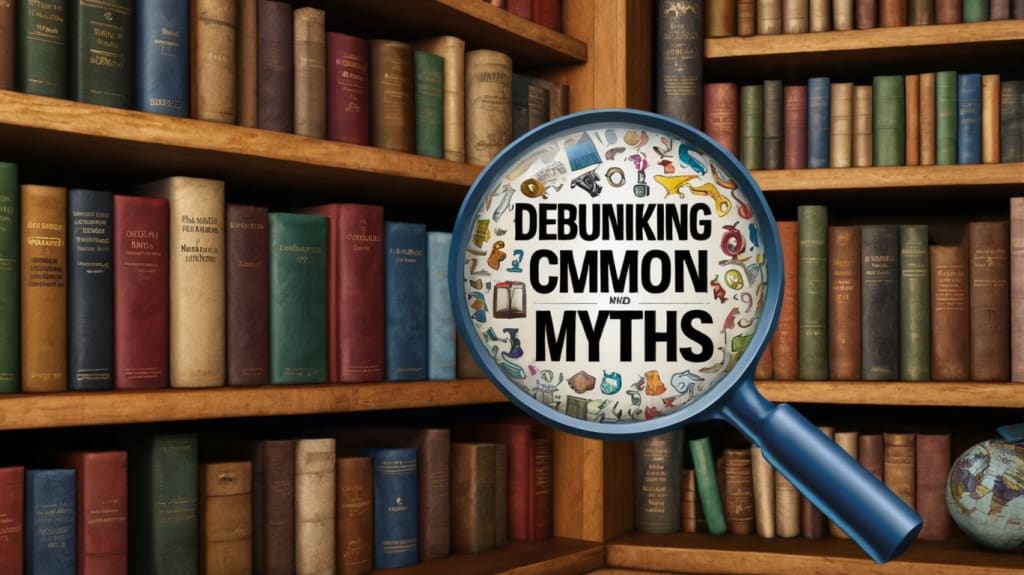Unveiling the Truth: Debunking Everyday Myths with Science
"Whispers of Truth: Unveiling Everyday Myths with Precision"

**Unveiling the Truth: Debunking Everyday Myths with Science**
*Introduction*
In our day-to-day lives, we encounter a plethora of myths and misconceptions that often influence our choices and behaviors. From health and nutrition to household hacks and cooking tips, separating fact from fiction can lead to more informed decisions and a better understanding of the world around us. Let's embark on a journey to unravel some common myths, backed by accurate facts and scientific explanations.
**Myth 1: Onion's Flu-Fighting Magic**
The myth that onions can fend off the flu or colds through methods like placing them in socks or consuming onion-infused water has gained popularity. However, while onions contain compounds like quercetin, known for their anti-inflammatory properties, there's little evidence to support their direct effectiveness against viruses. Onions do have nutritional benefits, such as vitamin C, fiber, and antioxidants, which contribute to overall health, but they aren't a substitute for medical treatments or vaccines.
**Myth 2: The Deodorant Dilemma**
A common misconception surrounding deodorant usage is the correct method to open a new stick. Contrary to popular belief, twisting the cap triggers the mechanism, eliminating the need for manual prying. Additionally, applying deodorant in the evening, when body temperature is lower, can enhance its efficacy. This is because the active ingredients have more time to absorb and create a protective barrier against sweat and odor.
**Myth 3: Shower Curtain Placement**
The debate over whether the shower curtain should be inside or outside the tub has puzzled many. Placing it inside reduces splashing and prevents water from escaping onto the bathroom floor, maintaining a cleaner and drier bathroom environment. Proper placement also helps to prevent mold and mildew growth, as the curtain can dry more effectively when used correctly.
**Myth 4: Gardening Misconceptions**
Watering plants on scorching days is often believed to harm them, but in reality, rain showers during summer provide vital moisture. Another myth pertains to tree roots, with many assuming they only extend to the outer edge of branches. However, numerous trees have root systems far exceeding their crown diameters, sometimes spreading two to three times wider. Additionally, it's commonly thought that pruning in the summer can harm plants, yet summer pruning can help manage growth and promote the health of certain species.
**Myth 5: Cooking Conundrums**
A prevalent myth is that shucking corn before boiling it is easier, yet partially shucking corn for grilling can enhance flavor. Similarly, it’s often believed that rinsing pasta after cooking removes excess starch and makes it less sticky. In truth, the starch helps sauces adhere better to the pasta. Storing eggs in the fridge door and nuts in the refrigerator are also common misconceptions. Eggs should be stored in the main body of the fridge where the temperature is more consistent, while nuts can stay fresh longer in the freezer due to their high-fat content.
**Myth 6: Nutritional Fallacies**
Roasting nuts is believed to decrease their nutritional value, but the impact is primarily on flavor and texture rather than nutrients. While some vitamins are sensitive to heat, roasting nuts doesn’t significantly reduce their health benefits. Similarly, avocados are often misunderstood as fattening, despite their abundance of healthy fats beneficial for heart health. Avocados also provide fiber, vitamins, and minerals that are essential for a balanced diet.
**Myth 7: Dietary Misunderstandings**
Swapping white sugar for alternatives like honey or maple syrup is thought to be healthier, yet all added sugars should be consumed in moderation. These alternatives may have slight differences in nutrient content, but they still affect blood sugar levels similarly to regular sugar. The myth that full-fat products lead to weight gain overlooks the importance of healthy fats in a balanced diet. Full-fat dairy products, for instance, can be more satiating and provide essential nutrients like calcium and vitamin D. Likewise, low-carb diets are not universally effective and may lack essential nutrients if not well-planned. Carbohydrates are a vital energy source, and whole grains, fruits, and vegetables should be included in a healthy diet.
**Myth 8: Detox Diet Delusions**
Detox diets promising to cleanse the body of toxins and aid weight loss are prevalent but unnecessary. The body has its detoxification mechanisms, primarily the liver and kidneys, which efficiently eliminate waste. Most detox diets lack scientific backing and can sometimes be harmful due to their restrictive nature. Instead, a balanced diet rich in fruits, vegetables, whole grains, and lean proteins supports the body's natural detoxification processes.
**Myth 9: Cracking Knuckles Causes Arthritis**
Many people believe that cracking knuckles can lead to arthritis. However, studies have shown that there's no significant link between knuckle cracking and arthritis. The sound produced by cracking knuckles is due to the release of gas bubbles from the synovial fluid in the joints. While habitual knuckle cracking might cause some hand swelling or reduced grip strength over time, it doesn't cause arthritis.
**Myth 10: Microwave Radiation Harms Food**
There's a common fear that microwave radiation can make food harmful or less nutritious. In reality, microwaving food is one of the safest and most nutrient-preserving cooking methods. Microwave ovens cook food quickly using non-ionizing radiation, which doesn't make food radioactive. In fact, because microwaving often uses less water and shorter cooking times, it can help retain more vitamins and minerals compared to other cooking methods.
**Practical Life Hacks**
Amidst these myths, practical life hacks can enhance daily routines. For instance, using a wooden spoon to prevent pot boil-overs can save time and reduce mess. Placing a wooden spoon across the top of a pot can break the surface tension of the water, preventing it from boiling over. Another useful tip is positioning a cheese grater horizontally for ease of use, making grating faster and less strenuous.
Moreover, using a binder clip to organize cables or hanging a tennis ball in the garage to mark the perfect parking spot can simplify everyday tasks. These practical hacks not only improve efficiency but also add convenience to our daily lives.
*Conclusion*
Separating fact from fiction empowers individuals to make informed choices and adopt healthier habits. By debunking common myths with scientific evidence, we pave the way for a more knowledgeable and mindful approach to everyday life. Understanding the truth behind these myths helps us make better decisions, from our health and nutrition to practical household tips, ultimately leading to a more informed and enriched life.
This exploration of common myths illustrates the importance of questioning and researching the information we encounter. As we continue to uncover the truth, we can better navigate our world, making choices that are backed by science and reason. Embracing this approach not only debunks misconceptions but also fosters a culture of curiosity and continuous learning.
About the Creator
Enjoyed the story? Support the Creator.
Subscribe for free to receive all their stories in your feed. You could also pledge your support or give them a one-off tip, letting them know you appreciate their work.





Comments
There are no comments for this story
Be the first to respond and start the conversation.